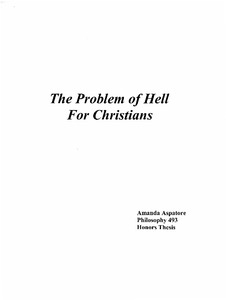| dc.rights.license | In Copyright | en_US |
| dc.creator | Aspatore, Amanda Elizabeth | |
| dc.date.accessioned | 2023-01-23T18:29:48Z | |
| dc.date.available | 2023-01-23T18:29:48Z | |
| dc.date.created | 2004 | |
| dc.identifier | WLURG38_Aspatore_thesis_2004 | |
| dc.identifier.uri | https://dspace.wlu.edu/handle/11021/36075 | |
| dc.description.abstract | At one point or another, almost every human being has considered and questioned the possibility of the existence of some sort of higher being and of an afterlife. The Christian faith teaches that there exists such a being, God, who is omniscient, omnipotent, and perfectly good, and that there exists an afterlife in which some souls are granted eternal salvation in heaven while others are consigned to an eternal fiery torment in hell. Yet frequently such questions arise as how can a perfectly good God allow innocent beings to suffer?, why would such a God have created a world in which there is evil at all?, and how could such a God eternally turn his back on a being he himself created and allow that being to suffer the worst imaginable torment for all eternity? Because there is an apparent contradiction between God's perfect goodness, omnipotence, and allowance of evil both in this world and the next, many theologians and philosophers have attempted to give reason-based arguments in support of their compatibility. While some of these arguments may give good explanations for why a perfectly good God would allow for the existence of some particular evils
in the world, it is my contention that none of them are able to give a rational basis for the existence of the hell of Christianity. Ultimately, God's perfect goodness, omnipotence, and omniscience are incompatible with the existence of a place of eternal torment, where God forever punishes the wicked for their misdeeds on earth, and if one is to believe in the existence of both then that belief must be based on an appeal to their religious faith alone, for no rational argument can reconcile the two. [From Overview] | en_US |
| dc.format.extent | 39 pages | en_US |
| dc.language.iso | en_US | en_US |
| dc.rights | This material is made available for use in research, teaching, and private study, pursuant to U.S. Copyright law. The user assumes full responsibility for any use of the materials, including but not limited to, infringement of copyright and publication rights of reproduced materials. Any materials used should be fully credited with the source. | en_US |
| dc.rights.uri | http://rightsstatements.org/vocab/InC/1.0/ | en_US |
| dc.subject.other | Washington and Lee University -- Honors in Philosophy | en_US |
| dc.title | The Problem of Hell for Christians | en_US |
| dc.type | Text | en_US |
| dcterms.isPartOf | RG38 - Student Papers | en_US |
| dc.rights.holder | Aspatore, Amanda Elizabeth | en_US |
| dc.subject.fast | Theodicy | en_US |
| dc.subject.fast | Philosophical theology | en_US |
| dc.subject.fast | Hell -- Christianity | en_US |
| dc.subject.fast | Good and evil -- Religious aspects -- Christianity | en_US |
| local.department | Philosophy | en_US |
| local.scholarshiptype | Honors Thesis | en_US |
